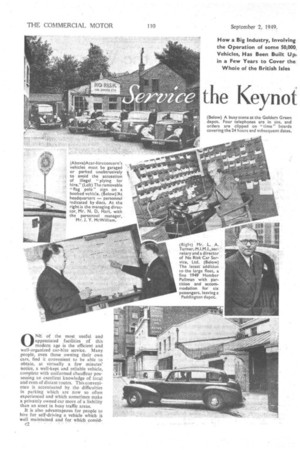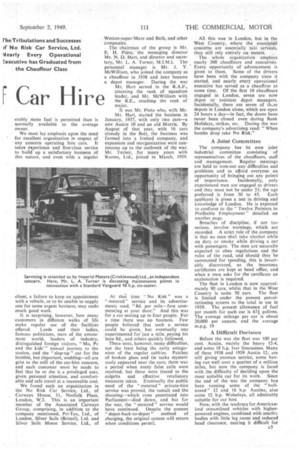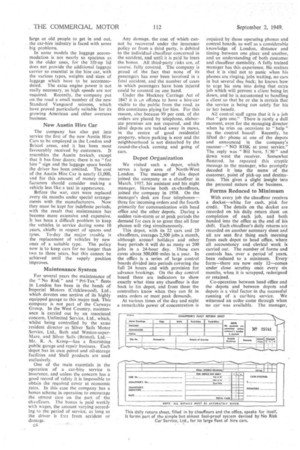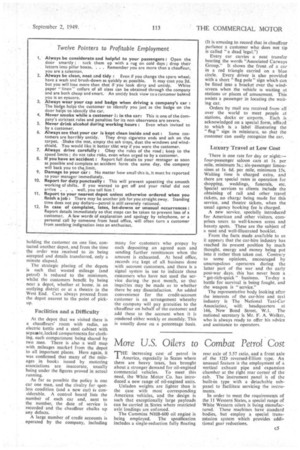the Keynot Car Hire
Page 40

Page 41

Page 42

Page 43

If you've noticed an error in this article please click here to report it so we can fix it.
How a Big Industry, Involving the Operation of some 50,000 Vehicles, Has Been Built Up, in a Few Years to Cover the Ihe Tribulations and Successes )1 No Risk Car Service, Ltd.
early Every Operational Executive has Graduated from Whole of the British Isles the Chauffeur Class
0 NE of the most useful and appreciated facilities of this modern age is the efficient and well-organized car-hire service. Many people, even those owning their own cars, find it convenient to be able to obtain, at virtually a few minutes' notice, a well-kept and reliable vehicle, complete with uniformed chauffeur possessing an excellent knowledge of local and even of distant routes. This convenience is accentuated by the difficulties in parking which are now so often experienced and which sometimes make a privately owned car more of a liability than an asset in busy traffic areas, It is also advantageous for people to hire for self-driving a vehicle which is well maintained and for which consid
erably more fuel is permitted than is normally available to the average owner.
We must lay emphasis upon the need for excellent organization in respect of any concern operating hire cars. It takes experience and first-class service to build up a satisfactory business of this nature, and even with a regular client, a failure to keep an appointment with a vehicle, or to be unable to supply one for some urgent business, may undo much good work.
It is surprising, however, how many customers in different walks of life make regular use of the facilities offered. Lords and their ladies, famous politicians, stars of the amusement world, leaders of industry, distinguished foreign visitors, "Ma, Pa and the kids'" annual journey to the station, and the " slap-up " car for the bumble, but important, wedding—all are grist to the mill of the car-hire concern, and each customer must be made to feel that he or she is a privileged user, given personal attention, and comfortable and safe travel at a reasonable cost.
We found such an organization in the No Risk Car Service, Ltd., of Carways House, 31, Norfolk Place, London, W.2. This is an important member of the Associated Catways Group, comprising, in addition to the company mentioned, Pr-Tax, Ltd., of London, Silver Sails (Bristol), Ltd. and Silver Sails Motor Service, Ltd., of Weston-super-Mare and Bath, and other companies.
The chairman of the group is Mr. E. H. Pinto, the managing director Mr. N. D. Hart, and director and secretary, Mr. L. A. Turner, M.I.M.I. The personnel manager is Mr. J. Y. McWilliam, who joined the company as a chauffeur in 1938 and later became a depot manager. During the war Mr. Hart served in the R.A.E, attaining the rank of squadron leader, and Mr. IVIcWilliam with the RE., reaching the rank of major.
It was Mr. Pinto who, with Mr. Mr. Hart, started the business in January, 1437, with only two cars—a new Austin 10 and an old Morris. By August of that year, with 16 cars already in the fleet, the business was formed into a limited company, and expansion and reorganization were continuous up to the outbreak of the war. Mr. Turner, for many years with Rootes, Ltd., joined in March, 1939.
At that time "No Risk" was a " metered " service and its advertisements read. "8d. per mile—fare commencing at your door." And this was for a car seating up to four people. For a time there was no business. Few people believed that such a service .could be given, but eventually one experimented for just a mile, paying his bare 8d., and others quickly followed.
There were, however, many difficulties, not the least being the early antagonism of the regular cabbies. Patches of broken glass and tin tacks mysteriously appeared near the cars; there was a period when many false calls were received, but these were traced to the culprits and effective retaliatory measures taken. Eventually the public need of the " metered" private-hire service was proved, the tumult and the shouting—which even penetrated into Parliament—died down, and but for the war, the "metered" service would have continued. Despite the present " depot-back-to-depot" method of charging, the original system will return when conditions permit. All this was in London, but. in the West Country, where the associated concerns are essentially taki'services, they still rely entirely on meters.
The whole organization employs nearly 300 chauffeurs and executives. Every opportunity of advancement is given to them. Some of the drivers have been with the company since it started, and nearly every operational executive has served as a chauffeur at some time. Of the first 10 chauffeurs engaged in London, seven are now depot or assistant depot managers. Incidentally, there are seven of these depots in London alone, which are open 24 hours a day—in fact, the doors have never been closed, even during Bank Holidays, strikes, etc. During the war the company's advertising read: "When bombs drop take No Risk."
A joint Committee
The company has its own joint industrial committee consisting of representatives of the chauffeurs, staff and management. Regular meetings are held to iron-out any difficulties and problems and to afford everyone an opportunity of bringing out any poinN7 of importance. Incidentally, only experienced men are engaged as drivers and they must not be under 21; the age preferred is from 30 to 45. Each applicant is given a test in driving and knowledge of London. He is expected to conform to the " Twelve Pointers to Profitable Employment" detailed on another page.
Breaches of discipline, if not too serious, involve warnings, which are recorded. A strict rule of the company is that no man shall take alcohol while on duty or smoke while driving a car with passengers. The men are naturally expected to obey regulations and the rules of the road, and should they be summoned for speeding, this is invariably discovered, as the insurance certificates are kept at head office, and when a man asks for the certificate an explanation is required.
The fleet in London is now approximately 90 cars, whilst that in the West Country is some 50 cars. The fleet is limited under the present petrolrationing system to the total in use in 1939. The present allowance of fuel per month for each car is 671 gallons. The average mileage per car is about 20,000 per annum, and the average m.p.g. 19
A Difficult Decision Before the war the fleet was 100 per cent. Austin, mainly the heavy 12-4, and some 18 h.p. "Ever limousines. Many of these 1938 and 1939 Austin 11. are still giving yeoman seryice, some having run well over a quarter of a million miles, but now the company is faced with the difficulty of deciding upon the most suitable car for its work. Since the end of the war the company has been running some of the " bullnosed " 12 and 16 h.p. Austins, also some 12 h.p. Wolseleys, all admirably suitable for car hire.
Now, with the tendency for Americanized streamlined vehicles with higherpowered engines, combined with smallet bodies with little leg room and reduced head clearance, making it difficult for large or old people to get in and out, the car-hire industry is faced with some big problems.
In some models the luggage accommodation is not nearly so spacious as in the older ones, for the lift-up lid does not provide the additional luggage carrier so essential in the hire car, with the various types, weights and sizes of luggage which have to be accommodated. The extra engine power is not really necessary, as high speeds are not required. Recently, the company put on the road a small number of the new Standard Vanguard saloons, which have proved particularly suitable for its growing American and other overseas business.
New Austin Hire Car The company has also put into service the first of the new Austin Hire Cars to be employed in the London and Bristol areas, and it has been most favourably received by customers. It resembles the Austin taxicab, except that it has four doors; there is no "for hire sign and the luggage space beside the driver has been omitted. The cost of the Austin Hire Car is nearly £1,000, and for this amount of money manufacturers should consider making a vehicle less like a taxi in appearance.
Before the war, cars were replaced every, six months under special arrangements with the manufacturers. Now they must be kept for indefinite periods, with the result that maintenance has become more extensive and expensive. It has been a difficult problem to keep the vehicles in service during some 10 years, chiefly in respect of spares and tyres. To-day the major trouble is the replacement of vehicles by new ones of a suitable type. The policy now is to keep cars for no longer than Iwo to three years, but this cannot be achieved until the supply position improves.
Maintenance System
For several years the maintenance of the "No Risk" and " Pri-Tax" fleets in London has been in the hands of Imperial Motors (Cricklewood), Ltd., which devotes one section of its highly equipped garage to this major task. This company is not part of the Carways Group. In the West Country, maintenance is carried out by an associated. concern, Unlimited Service, Ltd., which, whilst being controlled by the same resident director as Silver Sails Motor Service, Ltd., Bath and Weston-superMare. and Silver Sails (Bristol), Ltd.— Mr. R. A. Kemp—has a flourishing public garage and repair business. Each depot has its own petrol and oil-storage facilities and Shell products are used exclusively.
One of the main essentials in the operation of a car-hire service is insurance, and unless the concern has a good record of safety it is impossible to obtain the required cover at economic rates. In this case the company has a bonus scheme in operation to encourage the utmost care on the part of the chauffeurs. The bonus is paid weekly with wages, the amount varying according to the period of service, as long as the driver is free from accident or damage.
c4 Any damage, the cost of which cannot •be recovered under the insurance policy or from a third party, is debited to the individual chauffeur concerned in the accident, and until it is paid he loses the bonus. All third-party risks are, of course, fully covered. The company is proud of the fact that none of its passengers has ever been involved in a fatal accident, and the number of cases in which passengers have been injured could be counted on one hand.
Under the Hackney Carriage Act of 1847 it is n offence to have a hire-car visible to the public from the road, as this constitutes plying for hire. For this reason, also because 99 per cent. of the orders are placed by telephone, elaborate premises are not required, and the ideal depots are tucked away in mews, in the centre of good residential property, where parking is easy and the neighbourhood is not disturbed by the round-the-clock coming and going of cars.
Depot Organization
We visited such a depot, which serves a large area of North-West London. The manager of this depot joined the company as a chauffeur in March, 1937, his assistant and his night manager, likewise both ex-chauffeurs, joined the company in 1938. On the manager's desk are four telephones— three for incoming orders and the fourth primarily for communication with head office and the other depots. During a sudden rain-storm or at peak periods the demand for cars is so great that all four phones will ring simultaneously.
This depot, with its 22 cars and 20 chauffeurs, averages 2,500 jobs a month, although around holidays and other busy periods it will do as many as 200 jobs in a 24-hour day. These cars cover about 500,000 miles in a year. In the office is a series of large control boards divided into periods covering the full 24 hours and with provision for advance bookings. On the day control board there are indicators to show exactly what time any chauffeur is due back to his depot, and from these the controllers know when they can fit in extra orders or meet peak demands.
At various times of the day and night a remarkable power of concentration is required by those operating phones and control boards, as well as a considerable knowledge of London, distance and timing between one place and another, and an understanding of both customer and chauffeur mentality. A fully trained manager has this experience. He realises that it is vital not to panic when his phones are ringing, jobs waiting, no cars in but several due back; he knows how to urge his men into doing that extra job which will prevent a client being let down, and he is accustomed to handling a client so that he or she is certain that the service is being run solely for his or her benefit.
All control staff agree that it is a job that "gets one." There is rarely a dull• moment, even for the managing director when he tries on occasions to "help" on the control board! Recently, he lifted tho phone at one of the depots and announced in the company's manner—" NO RISK at your service." The reply was "Bill here, 5/30" and down went the receiver. Somewhat flustered, he repeated this cryptic message to the manager, who promptly decoded it into the name of the customer, point of pick-up and destination. This gives a slight insight into the personal nature of the business.
Forms Reduced to Minimum
With every job the chauffeur receives a docket—white for cash, pink for credit. The details on the docket are recorded on his daily return sheet on completion of each job, and both handed into the office at the end of his shift. Each chauffeur's daily returns are recorded on another summary sheet and all are sent first thing each morning from each depot to head office, where all accountancy and clerical work is carried out. The number of forms and controls has, over a period of years, been reduced to a minimum. Every form—there are now only 12--cornes under close scrutiny once every six months, when it is scrapped, redesigned or retained.
Co-operation between head office and the depots and between depots and depots is a vital factor in the successful running of a cal-hire service. We witnessed an order come through when no car was available. The manager,
holding the customer on one line, contacted another depot, and from the time the order was received to its being accepted and details transferred, only a minute elapsed.
The strategic placing of the depots is such that wasted mileage (and petrol) is reduced to the minimum, whilst the customers benefit by being near a depot, whether at home, in an outlying district or at a theatre in the West End. Cars always proceed from the depot nearest to the point of pickup.
Facilities and a Difficulty
At the depot that we visited there is a chauffeurs' room with radio, an electric kettle and a steel cabinet with sepasate,locked compartments for clothing, each compartment being shared by two men. There is also a wall map with mileages marked from the depot to all important places. Here again, it was confirmed that many of the mileages in books issued by motoring associations are inaccurate, usually being under the figures proved in actual running.
As far as possible the policy is one car one man, and the rivalry for spotless condition (and a new car) is considerable. A control board lists the number of each car and, next to the number, the date of service is recorded and the chauffeur chalks up any defects.
A large number of credit accounts is operated by the company, including many for customers who prepay by each depositing an agreed sum and sending further remittances when the amount is exhausted. At head office, records are kept of all business done with account customers, and there is a signal system in use to indicate those customers who have not used the service during the past month, so that inquiries may be made as to whether there he any dissatisfaction. An added convenience for the credit-account customer is an arrangement whereby the company will pay gratuities to the chauffeur on behalf of the customer and add these to the account when it is rendered either weekly or monthly. This is usually done on a percentage basis. (It is amusing to record that in chauffeur parlance a customer who does not tip is called "a dead legal.") Every car carries a neat transfer bearing the words "Associated Carways Group." It shows the front of a car in a red triangle carried on a blue circle. Every driver is also provided with a short "flag pole" sign which can be fitted into a bracket over the windscreen when the vehicle is waiting at stations or places of amusement. This assists a passenger in locating the waiting car.
Orders by mail are received from all over the world to meet people at stations, docks or airports. Each is acknowledged on a special form, affixed to which is a label illustrating the " flag" sign in miniature, so that the customer can easily recognize the car.
Luxury Travel at Low Cost
There is one rate for day or night:four-passenger saloon cars at Is. per mile, minimum 3s.; six-passenger limousines at Is 6d. per mile, minimum 15s. Waiting time is charged extra, and there are special rates in operation for shopping, weddings, funerals, etc. Special services to clients include the obtaining of rail and other travel tickets, no charge being made for this service, and theatre t:tckets, when the usual agency booking fee is charged.
A new service, specially introduced for American and other visitors, comprises tours to well-known areas and beauty spots. These are the subject of a neat and well-illustrated booklet.
From the facts made available to us it appeare that the car-hire industry has reached its present position by much thought, energy and money being put into it rather than taken out. Contrary to some opinions, encouraged by unscrupulous operators during the latter part of the war and the early post-war days, this has never been a "get-rich-quick" business. To-day a battle for survival is being fought, and the weapon is "service."
The representative body looking after the interests of the car-hire and taxi industry is The National Taxi-Car Associatioa, with headquarters at 146, New Bond Street, W.I. The national secretary is Mr. F. A. Walker, who is always ready to offer his advice and assistance to operators.




























































































